Public employees, including teachers, in 26 states will face federal vaccination requirement
- Oops!Something went wrong.Please try again later.
WASHINGTON –The actions President Joe Biden took this month to increase the number of workers who are vaccinated against COVID-19 will apply not just to most federal employees and larger businesses.
State and local government workers in 26 states, including teachers and school staff, will also be affected by the new workplace rules being written by Washington.
That includes workers in some states that have banned vaccination requirements for public employees, setting up another clash between GOP-led states and the Democratic administration.
Biden made no mention of vaccine requirements for state and local workers when announcing new rules for private-sector employees in a speech at the White House on Sept. 9. But a decades-old law means that more than half the states in the country must enforce similar rules for their public workers under the president's plan.
Labor Department spokeswoman Denisha Braxton confirmed to USA TODAY that Biden's new rules will "apply to public-sector state and local government workers, including educators and school staff" in 26 states and two territories.
In Arizona, a state that has blocked vaccination requirements, Tucson Mayor Regina Romero welcomed the federal backup.
“It will be absolutely incredibly supportive of the city of Tucson and making sure that our public sector employees are not just protecting each other, but that we're also protecting the public that they interact with,” Romero, a Democrat, told USA TODAY.
The city recently paused its vaccination mandate for city workers after Arizona Attorney General Mark Brnovich declared it illegal.
Legal challenge: Arizona sues over federal vaccine rules for workers
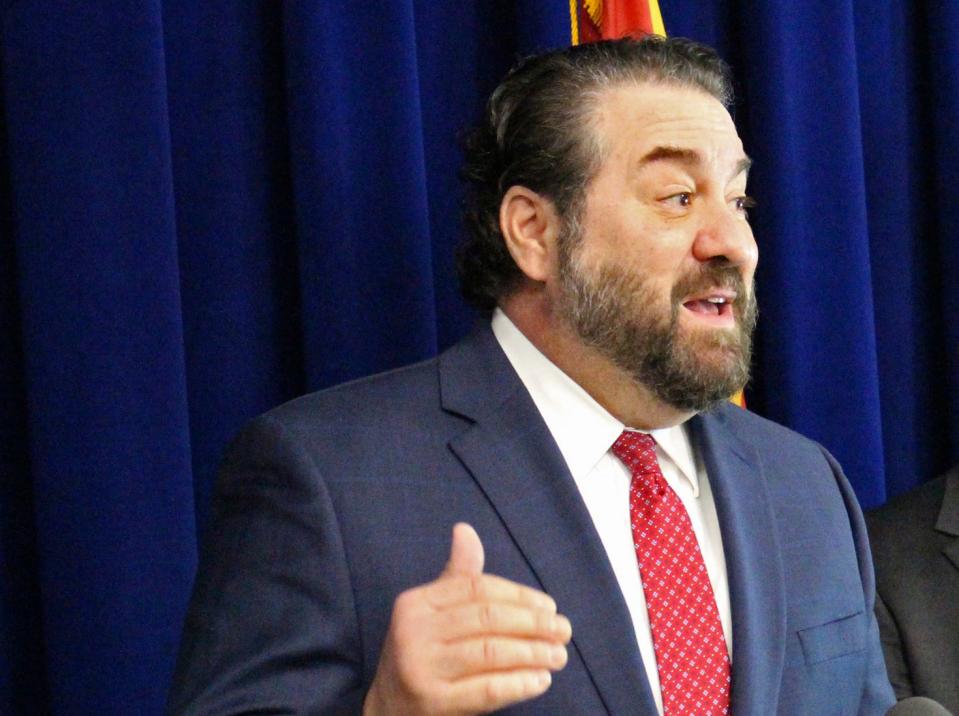
Brnovich has also asked a court to declare the pending federal actions unconstitutional.
His complaint doesn’t mention the conflict with state law. Instead, Brnovich argues that U.S. citizens shouldn’t have to get the vaccine when people crossing the southern border illegally do not.
A spokesman for Arizona’s labor department said the agency cannot comment on the new rules until they are finalized.
Biden's biggest steps yet
There are limits on Biden's ability to require vaccinations. But after months of cajoling Americans to get immunized against the coronavirus, he took his strongest steps yet in areas where he has authority.
Biden announced that most federal workers and millions of federal contractors must be vaccinated.
'Patience is wearing thin': Biden rolls out vaccine requirements that will affect 100 million workers
More: Who is covered by Biden's new vaccine mandates and when do they go into effect?
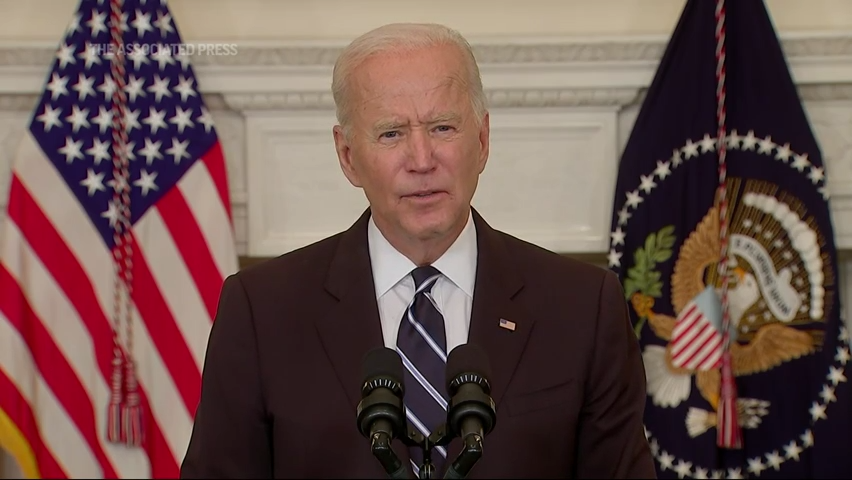
That order does not apply to the federal legislative and judicial branches, which the president does not control.
Those branches, whose tens of thousands of workers are a small share of the total pool of federal employees, are also not covered by the federal Occupational Safety and Health Administration, which regulates private sector workplaces.
Biden directed OSHA to require that employers with 100 or more workers ensure those workers are vaccinated or tested weekly for the coronavirus. Employers could be slapped with penalties of up to $13,600 per violation if they don’t comply.
The administration estimates the emergency rule will affect more than 80 million private sector workers.
The 1970 law creating OSHA excluded states and local jurisdictions from the definition of "employer."
But states have the option of setting their own workplace policies and handling enforcement. If they do, however, their rules have to be “at least as effective” as OSHA’s. They must also apply to state and local workers.
The 21 states that took that approach are Alaska, Arizona, California, Hawaii, Indiana, Iowa, Kentucky, Maryland, Michigan, Minnesota, Nevada, New Mexico, North Carolina, Oregon, South Carolina, Tennessee, Utah, Vermont, Virginia, Washington and Wyoming.
Another five states – Connecticut, Illinois, Maine, New Jersey and New York – have OSHA-approved plans specifically for public employees.
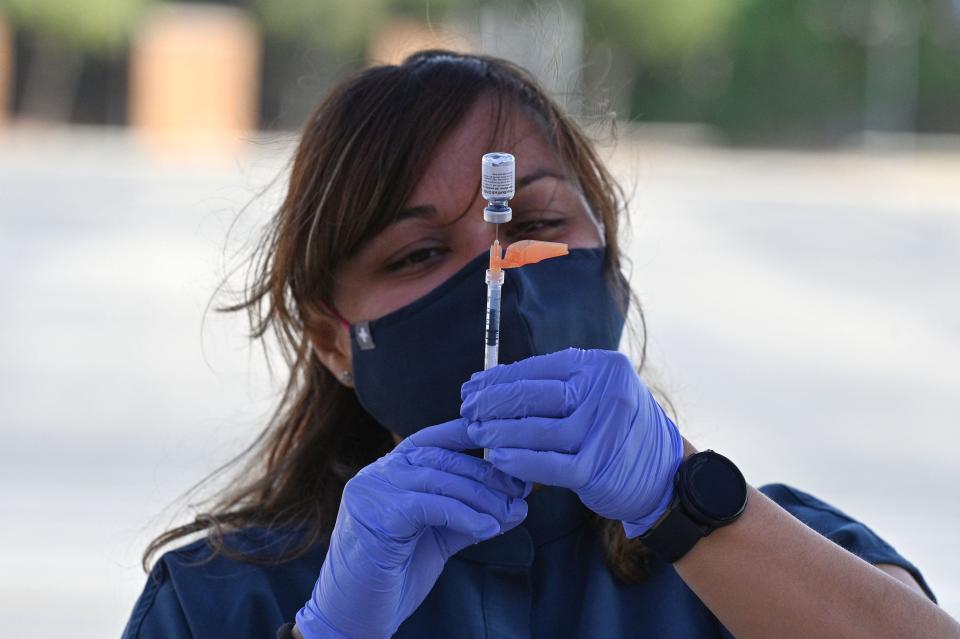
Asked this week whether Biden intended his requirement to apply to state and local government workers, White House press secretary Jen Psaki didn’t directly answer – but alluded to OSHA’s effect on some states.
“Obviously, leaders will make decisions on their own, but it's really state-to-state on whether it's applicable under OSHA requirements,” Psaki said.
Speaking at a middle school in Washington, D.C., the day after announcing his multipronged approach, Biden called on governors to require vaccinations for all teachers and staff.
"Look, I’m so disappointed that particularly some Republican governors have been so cavalier with the health of these kids, so cavalier with the health of their communities," Biden said. "This isn't a game. And I don't know of any scientist out there in this field that doesn't think it makes considerable sense to do the six things I've suggested."
What happens next
Administration officials have said the final language spelling out what employers need to do will be released in the “coming weeks.”
Once that happens, state labor departments with OSHA-approved plans will have a short amount of time – possibly 30 days – to update their own rules, according to experts.
Theoretically, those states can come up with their own approach – as long as it’s equally effective at preventing workplace exposure, said Gabrielle Wirth, a senior partner at the international law firm Dorsey & Whitney who regularly advises employers on vaccine issues.
“The vaccine is obviously where everybody's trying to push people because it is the most effective,” she said. “But it's not impossible that a state come up with something which included more social distancing, and N95 masks, half the workforce there every other week.”

David Michaels, an epidemiologist at George Washington University School of Public Health who headed OSHA during the Obama administration, said OSHA has few tools to get states to comply. They could take the major step of revoking a state’s program and sending in federal inspectors if a state balks.
“But that will take time, and it's unlikely to occur quickly, if at all,” he said. “And so it’ll likely be a standoff between those states and the federal government.”
When will everyone be vaccinated?: Here's how the COVID-19 vaccine rollout is going
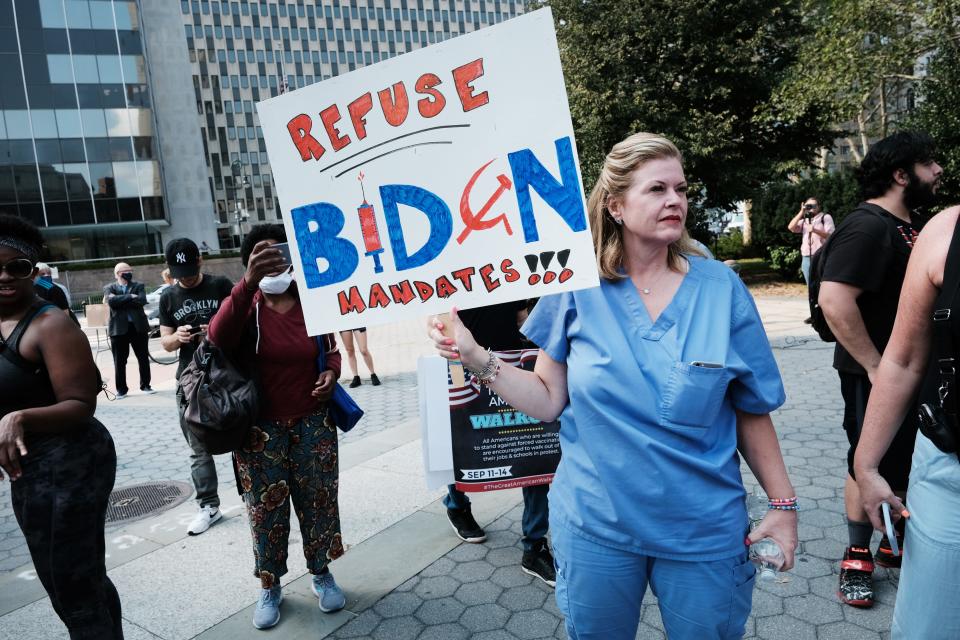
States waiting for details
OSHA estimates that state plans cover about 40% of public and private sector workers.
Asked about the forthcoming rule, a spokeswoman for Tennessee Gov. Bill Lee said the Biden administration has not released details “for how their attempt to impose sweeping mandates will actually work.”
“But we remain in close communication with the Tennessee attorney general,” said press secretary Casey Black.
In May, Lee signed a bill prohibiting state and local government agencies from requiring COVID-19 vaccines. Lawmakers did not extend the ban to businesses out of deference to the private sector.
In Tennessee’s Shelby County, Mayor Lee Harris is eager for federal help in the war he’s been waging against the coronavirus.
The county, which covers Memphis and its suburbs and employs more than 5,000 workers, has tried offering paid time off for vaccinations, cash incentives and has “done vaccine education until we’re blue in the face,” Harris said.
“At this point, it’s absolutely necessary,” he said of the federal intervention.
The county has already taken the governor to court over his executive order allowing parents to opt out of school mask requirements.
“I realize that everyone is really trying to meditate around what liberty means and so forth. But let's meditate around what it means to be a good neighbor and what the requirements of citizenship are in a democratic republic,” he said. “That's going to require us all to step up. This has been going on for 18 months.”
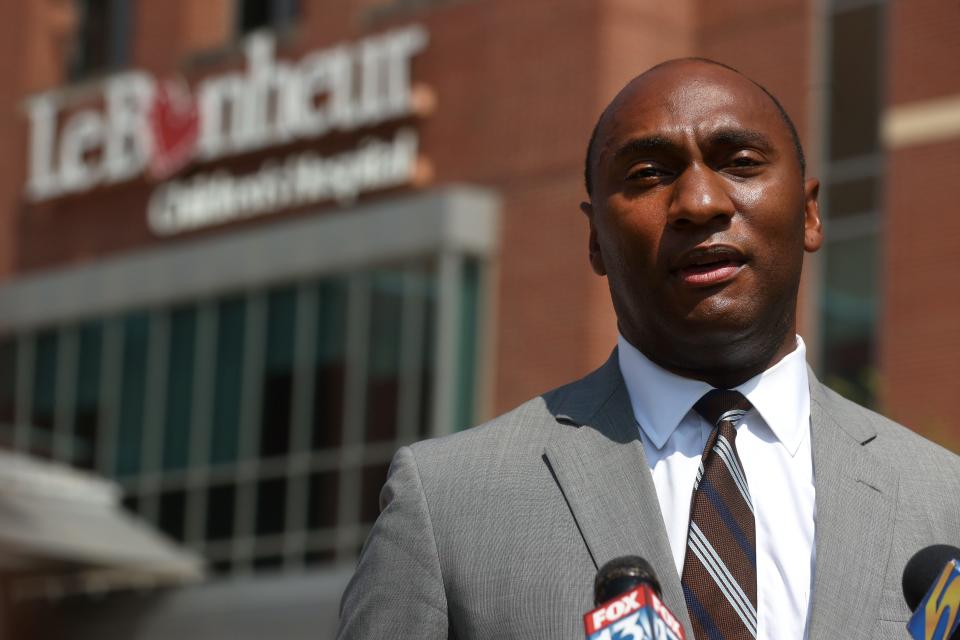
In Indiana, another state that blocked vaccination requirements for public employees, Indianapolis Mayor Joe Hogsett had a more subdued response to the federal action. Spokesman Mark Bode said the mayor encourages all eligible residents to get the vaccine and the city “will abide by the law as it is clarified to us by state and federal authorities.”
Bode declined to say whether Hogsett would have already required vaccination for city workers absent the state prohibition.
A spokesman for the Indiana Occupational Safety and Health Administration said the agency has been notified about the pending rule and will review it when it’s officially distributed.
States could also be affected by Biden’s vaccination requirement for federal contractors, according to Wirth, the expert at Dorsey & Whitney. Many state agencies contract with the federal government and have been subject to federal contract rules, she said.
Her law firm describes the administration’s definition of federal contract as “incredibly broad.”
Biden has said his various requirements, which also apply to workers at health care facilities that treat Medicare and Medicaid patients, will cover two-thirds of the nation’s workers.
GOP attorneys general threaten to sue
Republican attorneys general in nearly half the states told Biden on Thursday that they would go after the OSHA regulations if he persists.
“States have taken varying approaches to dealing with the virus,” the letter says, “and, whether you like it or not, that is how our constitutional structure is arranged.”
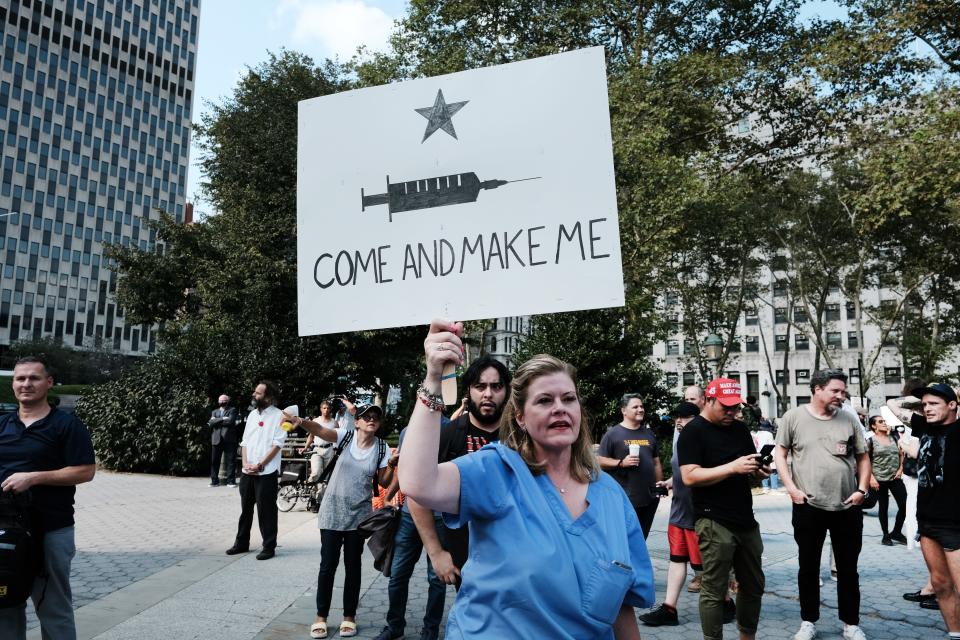
Even if vaccination requirements hadn’t become so politicized, the Labor Department would be expecting litigation.
“OSHA rules are almost always challenged in court,” Michaels said. “And OSHA generally wins.”
Michaels does have some concern that the pending rule applies only to workplaces with at least 100 employees. He said that limit was likely imposed “for political and economic considerations.” But it could make the rule harder to defend in court.
“There's no scientific reason to only apply these public health precautions to large employers,” he said.
The government has a less successful track record in proving that emergency standards – which preempt the more extensive regular rule-making process – are needed to counter a “grave danger.”
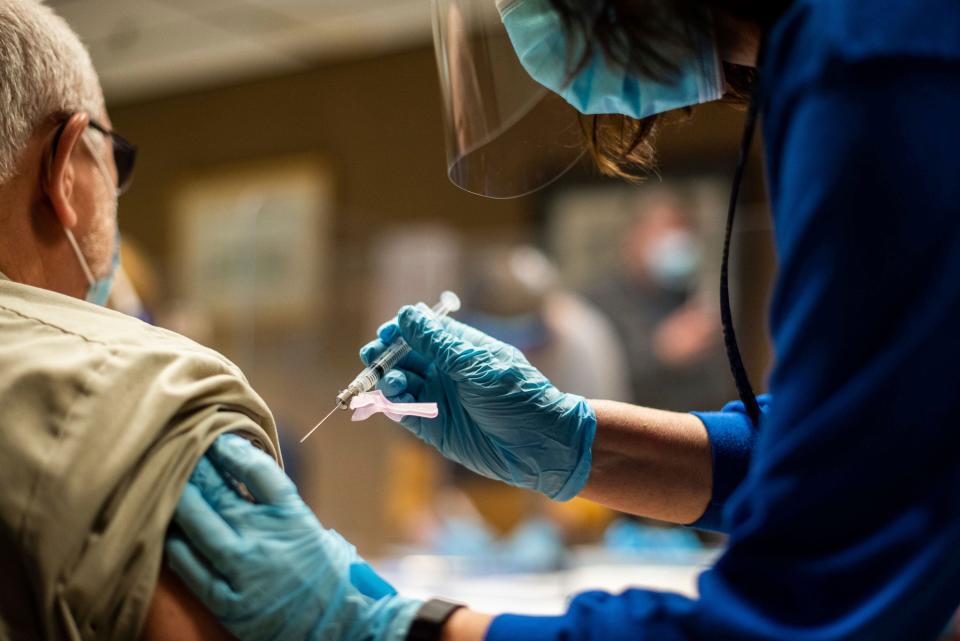
But the fact that exposure to the coronavirus can lead to an employee's death within the six-month window of an emergency rule “may be the one that proves the case,” said Sidney Shapiro, a Wake Forest law professor who has worked as an OSHA consultant.
Momentum of their own?
Even if the standards are tied up in court, he said, vaccination requirements could have a momentum of their own. The federal government may have taken into account that many employers want to do this but are looking for political cover, particularly in states that have banned mandates.
“Now, companies can say, 'The government made me do this,’” he said. “So, if companies were half inclined anyway, this may push them to do it. And then once that's in place, and they're already doing it, it's unlikely they're going to backtrack.”
In Arizona, Romero tried to get Tucson’s approximately 3,900 public employees vaccinated before a state ban prohibiting vaccine mandates for public employees went into effect at the end of September.

Before any workers were disciplined for not complying, the state attorney general warned the city not to continue.
But while it was in effect, vaccination rates for employees rose from 62% to 83%, according to Romero. That compares with the 66% of Tucson’s eligible population which is vaccinated.
The city is now moving to require face masks and regular testing for the remaining unvaccinated workers, the expected standard in the rules being written by OSHA.
Although Tucson was challenged not just by state officials but also by local police and firefighters over its mandate, Romero said she didn't hesitate to take that step.
“Absolutely I was prepared to mandate a vaccine that has been proven to be effective,” she said, “and that can keep our children safe and our employees safe, between each other and our community.”
Maureen Groppe has covered Washington for nearly three decades and is now a White House correspondent for USA TODAY. Follow her on Twitter @mgroppe.
More: Tracking COVID-19 vaccine distribution by state: How many people have been vaccinated?
This article originally appeared on USA TODAY: Federal vaccine rule will apply to public employees in 26 states

